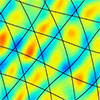| Dec 20, 2021 |
|
(Nanowerk News) When stacking two layers of van der Waals (vdW) materials, a moiré pattern is produced by the modulation of the long wavelength periodic potential. The moiré pattern is a promising means in engineering both the atomic geometry and electronic structure.
|
|
A variety of emergent phenomena have been discovered in twisted vdW bilayers of graphene or semiconducting transition-metal dichalcogenide (2H-TMD), however, little is known about the twisted bilayer of metallic 1T-TMD (transition metal dichalcogenide) materials.
|
 |
| Fig. 1: Scanning tunneling microscopy topographic images of various moiré patterns with different twist angles. (Image: NJU)
|
|
In a study published in Nature Materials (“Moiré enhanced charge density wave state in twisted 1T-TiTe2/1T-TiSe2 heterostructures”), researchers led by Prof. LI Shaochun at Nanjing University and Prof. MENG Sheng at the Institute of Physics (IoP) of the Chinese Academy of Sciences have discovered for the first time that the many-body effects, particularly the electronic quantum correlation, can be tuned in metallic vdW monolayers through moiré engineering.
|
 |
| Fig. 2: Moiré enhanced CDWs near 0°. (Image: NJU and IoP)
|
|
The researchers synthesized the epitaxial heterostructure of 11T-TiTe2/1T-TiSe2 with various twist angles using molecular beam epitaxy and investigated the moiré pattern induced/enhanced charge density wave (CDW) states with scanning tunnelling microscopy.
|
 |
| Fig. 3: Symmetric strain map. (Image: NJU)
|
|
They found that in 1T-TiTe2/1T-TiSe2 heterostructures, when the twist angle is near ∼0.5°, the profound 2×2 CDW domains are formed in 1T-TiTe2. The CDW domains are trapped in the moiré pattern and separated by the 1×1 normal-state regions.
|
|
This CDW state is significantly enhanced to persist even at room temperature. However, in larger twist angles, such moiré-trapped CDW patterns have not been observed. Using first-principles calculations within the framework density functional theory, they demonstrated that the formation of moiré-trapped CDW state can be ascribed to the local strain variations due to atomic reconstructions modulated by moiré patterns.
|
 |
| Fig. 4: Relative height and strain field of the heterostructures. (Image: IoP)
|
|
This study paves a new way to constructing metallic twisted vdW bilayers and tuning the many-body effects via moiré engineering.
|





